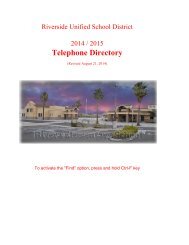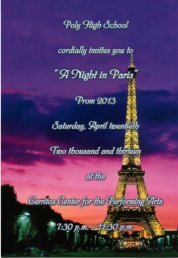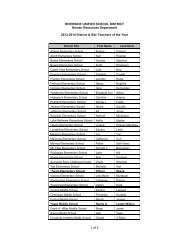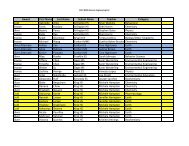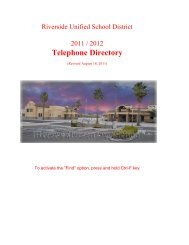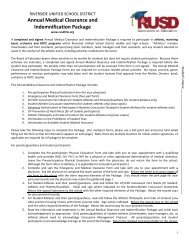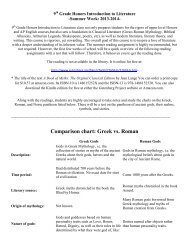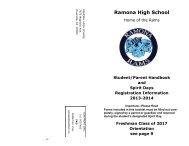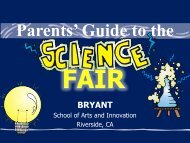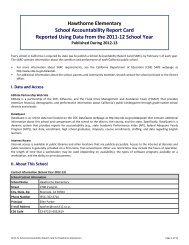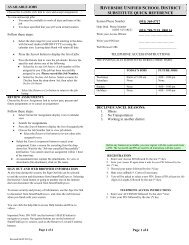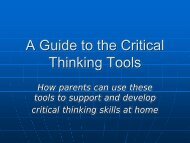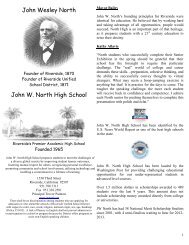CAHSEE ELA Study Guide - California High School Exit ...
CAHSEE ELA Study Guide - California High School Exit ...
CAHSEE ELA Study Guide - California High School Exit ...
You also want an ePaper? Increase the reach of your titles
YUMPU automatically turns print PDFs into web optimized ePapers that Google loves.
Word Analysis,<br />
Literary<br />
Written<br />
Fluency, and Reading<br />
Response Writing and Oral<br />
Systematic Compre- English<br />
Writing<br />
Vocabulary hension<br />
and Strategies<br />
Language<br />
Applications<br />
Development<br />
Analysis<br />
Conventions<br />
These are the 12 <strong>CAHSEE</strong> Literary Response and Analysis Standards.<br />
There are 20 multiple-choice questions that measure these standards.<br />
Literary response and analysis involves several skills, so this section of<br />
the <strong>Study</strong> <strong>Guide</strong> discusses some strategies that can help you succeed.<br />
You will be asked to read and understand stories, poems, plays, and<br />
essays. You should also be familiar with common literary devices and<br />
figurative language, especially the types found in poetry. The passages<br />
often deal with themes also present in other subjects such as social<br />
studies. The test questions, all multiple-choice, ask you to identify<br />
character traits, conflicts and relationships, and analyze patterns and<br />
themes.<br />
These passages and questions are from a previous version of the<br />
<strong>CAHSEE</strong>. Read each passage and answer each question. After each<br />
question, a strategy is provided to help you understand and practice<br />
your literary response and analysis skills.<br />
Literary Response<br />
10RL3.1 Articulate the relationship between the expressed purposes and<br />
the characteristics of different forms of dramatic literature (e.g.,<br />
comedy, tragedy, drama, dramatic monologue). [2 questions]<br />
10RL3.3 Analyze interactions between main and subordinate characters in<br />
a literary text (e.g., internal and external conflicts, motivations,<br />
relationships, influences) and explain the way those interactions<br />
affect the plot. [2 questions]<br />
10RL3.4 Determine characters’ traits by what the characters say about<br />
themselves in narration, dialogue, dramatic monologue, and<br />
soliloquy. [2 questions]<br />
10RL3.5 Compare works that express a universal theme and provide<br />
evidence to support the ideas expressed in each work.<br />
[2 questions]<br />
77
Literary Response and Analysis <br />
10RL3.6<br />
Analyze and trace an author’s development of time and sequence,<br />
including the use of complex literary devices (e.g.,<br />
foreshadowing, flashbacks). [2 questions]<br />
10RL3.7<br />
Recognize and understand the significance of various literary<br />
devices, including figurative language, imagery, allegory, and<br />
symbolism, and explain their appeal. [2 questions]<br />
10RL3.8<br />
Interpret and evaluate the impact of ambiguities, subtleties,<br />
contradictions, ironies, and incongruities in a text. [2 questions]<br />
10RL3.9<br />
Explain how voice, persona, and the choice of a narrator affect<br />
characterization and the tone, plot, and credibility of a text.<br />
[2 questions]<br />
Literary Response<br />
10RL3.10 Identify and describe the function of dialogue, scene designs,<br />
soliloquies, asides, and character foils in dramatic literature.<br />
[1 question]<br />
8RL.3.7 Analyze a work of literature, showing how it reflects the heritage,<br />
traditions, attitudes, and beliefs of its author. (Biographical<br />
approach) [Standards 8RL3.7 or 10RL3.11 or 10RL3.12 will be<br />
rotated for a total of 3 questions per test form.]<br />
10RL3.11 Evaluate the aesthetic qualities of style, including the impact of<br />
diction and figurative language, on tone, mood, and theme, using<br />
the terminology of literary criticism. (Aesthetic approach)<br />
[Standards 8RL3.7 or 10RL3.11 or 10RL3.12 will be rotated for a<br />
total of 3 questions per test form.]<br />
10RL3.12 Analyze the way in which a work of literature is related to the<br />
themes and issues of its historical period. (Historical approach)<br />
[Standards 8RL3.7 or 10RL3.11 or 10RL3.12 will be rotated for a<br />
total of 3 questions per test form.]<br />
78
Literary Response and Analysis <br />
Read this passage from a previous <strong>CAHSEE</strong> administration and the discussion and questions<br />
that follow.<br />
The Pendulum Swings<br />
1 Of all the days to forget to set the alarm! Running to catch the bus and trying to gather<br />
everything she needed for school had left her feeling very frazzled. Sheri felt rushed as she<br />
began her science test.<br />
2 As Sheri left the room, a pounding headache reminded her that she was certain that the<br />
test had not gone well. How could it have Not a moment all morning to relax. No time to<br />
review. No time to remind herself how well prepared she was. All because she forgot to set<br />
her clock for the first time since she had started attending school! “No one to blame but<br />
myself,” she lamented.<br />
3 That afternoon, she left school to go to work. She had been working at Beckman’s for two<br />
years, three afternoons a week. Finishing up for the night, Mrs. Beckman called her into the<br />
main office. “Sheri,” she said, “you have been a great worker, and we really appreciate all<br />
that you have done, but business has been slow. We have to let you go. I’ll happily give you<br />
a recommendation for another job.”<br />
4 Sheri was shocked. She left the office in a daze. As she walked slowly towards her aunt’s<br />
house, Sheri tried to think about the new hair style her aunt had promised her. When she<br />
arrived at the house, Sheri handed her aunt the magazine clipping that showed the cut and<br />
color she wanted, leaned back in the chair, and relaxed for the first time all day.<br />
5 “Well, you’re done. What do you think” her aunt asked about an hour later.<br />
6 Sheri slowly rotated her chair towards the mirror, very excited. What she saw left her<br />
speechless. It was absolutely nothing like the picture! How could she possibly go to school<br />
again She thanked her aunt and left, feeling dejected.<br />
7 The next day, she arrived at school early. She had set her alarm to make sure that she didn’t<br />
repeat her experience of the day before. Putting her things in her locker, she was approached<br />
by Ms. Drobick, the teacher who had given the test the day before.<br />
Literary Response<br />
79
Literary Response and Analysis <br />
Literary Response<br />
8 “I know, Ms. Drobick, I did very poorly on the test. It’s just that I forgot . . .”<br />
9 “What are you talking about Sheri, you did a great job! Best score I’ve ever seen!”<br />
Ms. Drobick said. “What I wanted to ask you is if you would be interested in working<br />
a few days a week after school as a lab assistant. I need some help organizing and labeling<br />
all the materials.”<br />
10 Sheri accepted. Not only would it be more interesting than working at Beckman’s, but she<br />
would also earn more money!<br />
11 “Sheri!” she heard as the rest of the students began to enter the building. “Where did you<br />
get your hair done” She was so happy about her test and new job that she had momentarily<br />
forgotten about her hair. She was instantly mortified.<br />
12 “Wow! You look amazing! That is soooo cool!” she was told. She couldn’t believe her ears.<br />
Everyone absolutely loved her hair!<br />
13 What a couple of days it had been! Walking home, she smiled as the radio of a passing car<br />
blared the song “What a Difference a Day Makes!”<br />
03C<br />
80
Literary Response and Analysis<br />
L103C001<br />
Sample <strong>CAHSEE</strong> question<br />
This passage is an example of what literary genre<br />
A fiction<br />
B drama<br />
C essay<br />
D autobiography<br />
Strategy<br />
Make sure that you know the characteristics of various literary<br />
genres. Dramas are always written in the form of plays with a list of<br />
characters, the setting, and identifications of each speaker. Essays are<br />
short compositions on a particular subject or theme. Autobiographies<br />
are accounts of a person’s life told by that person. This passage tells a<br />
story, most likely a made-up story. Even though what is being told<br />
might happen in real life, the passage mainly intends to entertain by<br />
telling a story.<br />
L103C004<br />
Sample <strong>CAHSEE</strong> question<br />
Which sentence BEST states the main theme of the passage<br />
A Life is full of uncertainty.<br />
B Things are not always as bad as they seem.<br />
C Time lost is never found.<br />
D True happiness is not found in material things.<br />
Strategy<br />
Make sure you understand what the question is asking. The question<br />
asks about theme. Think of plot as what happens, and think of theme<br />
as why the author is making certain events happen. What is the point<br />
the author is trying to make The theme is a dominant idea running<br />
throughout a passage. Also, pay attention to key words such as best.<br />
Although all four options are themes, some options do not pertain to<br />
the passage. In the passage, all these “disasters” turned out well,<br />
pointing to only one clear correct answer.<br />
Literary Response<br />
81
Literary Response and Analysis <br />
Read this passage from a previous <strong>CAHSEE</strong> administration and the discussion and questions<br />
that follow.<br />
The <strong>School</strong> Garden<br />
Literary Response<br />
Cast: <br />
MR. EMERSON, teacher <br />
Students in his class <br />
(Setting: Desert Sky <strong>High</strong> <strong>School</strong>, MR. EMERSON’s English class) <br />
MR. EMERSON: (As he fi nishes taking attendance.) Vargas, Warner, and Zuniga. Everyone’s <br />
here today. That’s great, because I have good news! Remember that “Keep America Beautiful” <br />
essay contest we entered a few weeks ago that was sponsored by Lakeside Nursery <br />
(Class murmurs, acknowledging this.) <br />
MR. EMERSON: We had an entry that came in first place. Raymond won with his essay on <br />
recycling! According to the judges, you all did very well, and they said it was a tough contest <br />
to judge. I’m really proud of you all! <br />
SARAH: So, Mr. Emerson, what exactly did Raymond win <br />
MR. EMERSON: Well, since it was someone from our class, we will be able to select plants <br />
from Lakeside Nursery and plant them on the school grounds. <br />
(The class groans.) <br />
SARAH: That’s the prize Plants for the school <br />
MR. EMERSON: Hey! Think about it. This will be great. We can find a little spot on the <br />
school grounds, fix it up with some colorful plants, and we can go there on nice afternoons and <br />
read or write in our journals. Plus, it will make the school look nicer. Everyone will enjoy it. <br />
NATHAN: So, you’re saying that we can attend class outside <br />
MR. EMERSON: Sure! I think it would be nice to hold class outdoors now and then. <br />
(Class begins to show approval.) <br />
HECTOR: Way to go, Raymond! <br />
RENE: Yeah, I could use some fresh air about this time of day. <br />
ALEX: So could I. But I had some place in mind other than the school grounds. Maybe the <br />
skate park! <br />
MR. EMERSON: (Laughing.) Sorry, not an option, Alex. We’re talking about creating a <br />
garden, which brings me to my next question: What kind of garden would you like to create <br />
JEN: A rose garden. <br />
82
Literary Response and Analysis<br />
MR. EMERSON: Rose gardens are nice. Yes, Carolina<br />
CAROLINA: Last week in Mrs. Villareal’s biology class we had a botanist come as a guest <br />
speaker.<br />
KARL: A whatanist<br />
CAROLINA: A botanist. A scientist who studies plants. Anyway, she said that Xeriscaping 1<br />
is a smart way to garden in this desert area.<br />
KARL: Now you’re really confusing me! What’s Xeriscaping<br />
MAX: Oh, I know! In our area, that’s when you use indigenous plants in your garden.<br />
KARL: (Rolling his eyes.) Why is it that people always use a complicated word when they’re <br />
defining another complicated word<br />
MR. EMERSON: Can anyone help Karl and tell him what indigenous means<br />
MACY: (Thumbing through her dictionary.) It says here: “existing, growing, or produced <br />
naturally in a region or country.”<br />
MR. EMERSON: Good job, Macy! That’s a dictionary point for you. (Addressing class.) Why <br />
do you think it’s a smart way to garden (Pauses.) Yes, Jennifer<br />
JENNIFER: Well, I think indigenous plants would require less watering, and that would save<br />
the school time and money.<br />
MR. EMERSON: Good point. In fact, Xeriscaping means growing plants with little water. <br />
Anything else<br />
JAMAL: If it grows in this region anyway, then it probably would be something that would be <br />
compatible with the soil, right<br />
MR. EMERSON: Makes sense. Anyone else<br />
JESSIE: It would probably need less maintenance than something that grows in another <br />
region.<br />
MR. EMERSON: Very good! I like the idea of Xeriscaping, but I’m also open for other ideas. <br />
Anyone<br />
(No one responds.)<br />
MR. EMERSON: Okay, then give me a show of hands. Who wants to have a Xeriscape <br />
garden<br />
(Most of the students raise their hands.)<br />
MR. EMERSON: Okay then, a Xeriscape garden it is. (Looks at the clock on the wall.) Now,<br />
with the time we have left, why don’t we go outside and find a spot for our new garden<br />
(The class exits excitedly.)<br />
Literary Response<br />
1<br />
Pronounced ZER-i-scaping<br />
03A<br />
83
Literary Response and Analysis<br />
L103A003<br />
Sample <strong>CAHSEE</strong> question<br />
Where does the drama take place<br />
A in an auditorium<br />
B in a skate park<br />
C outside a school building<br />
D in a classroom<br />
Strategy<br />
Remember that in a drama, directly below the list of characters is the<br />
setting. Questions that ask where the action takes place are asking<br />
about setting. To answer this question correctly, you only need to look<br />
back at the beginning of the drama.<br />
L103A004<br />
Literary Response<br />
Sample <strong>CAHSEE</strong> question<br />
How does the students’ attitude about the garden change during<br />
the play<br />
A from hopeful to disappointed<br />
B from unenthusiastic to supportive<br />
C from worried to confident<br />
D from approving to disapproving<br />
Strategy<br />
You can easily eliminate options that end in negative adjectives because<br />
the stage instructions tell that at the end of the play “the class exits<br />
excitedly.” You know that the students were not worried about winning<br />
the plants; they just were not excited at first. By eliminating incorrect<br />
options, you can find the correct answer.<br />
For more practice on these types of questions, go to the Released<br />
Test Questions at http://www.cde.ca.gov/ta/tg/hs/resources.asp.<br />
In the last three chapters, we have addressed the differences<br />
between fiction, biography, articles, and essays; asked you to read<br />
selections carefully for context clues, details, and evidence; encouraged<br />
you to use your common sense; given you some techniques for figuring<br />
out theme and main idea; and discussed tone.<br />
One more tip. Reading—reading every day—will help you become<br />
a better reader. Reading and discussing what you read will help<br />
even more.<br />
84



